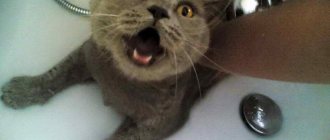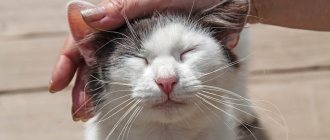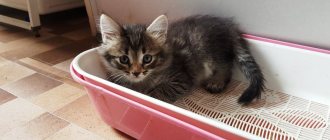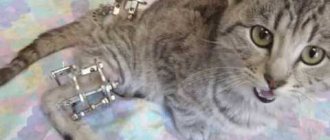Felinologists have identified the main reasons why cats are afraid of a vacuum cleaner - this is a reaction to noise, vibration, and also the appearance of the device. If a small kitten has formed a negative opinion about the device, then it can be easily retrained, but changing the attitude of an adult animal will require long-term work over 1-2 months. To avoid injuring the cat, it is better to carry out noisy cleaning when the pet is in another room.
A cat and a vacuum cleaner are the main “grievances” of an animal
Cats are afraid of vacuum cleaners for several reasons. And today, we will look at each of them.
- As mentioned earlier, pets do not like noise, so they are afraid of vacuum cleaners. You can understand the cat, because the vacuum cleaner is twice its size. Just imagine if there was something working next to you that was twice your size. You would probably be scared too.
- Another reason why pets are afraid of the vacuum cleaner is the behavior of cat owners. Yes, yes, exactly in them. Very often, for fun, the owner of a cat deliberately scares the pet with a vacuum cleaner, drawing the pet's fur into this device. Yes, such a sight looks very funny, but think about your cat. At this moment, the poor thing is experiencing extreme stress. Therefore, for the safety of your pet, never try to “vacuum” your pet.
- Most cats see the vacuum cleaner as “an unknown monster. That is why they run away from him, hiding under the sofa, and watch the “monster” from afar. By the way, the bravest cats even fight with the vacuum cleaner.
Cats are cute, defenseless animals that need to be protected and protected from everything. That is why you should never scare a cat with a vacuum cleaner. It is best to accustom your pet to noise.
Owner's poor judgment
Usually, the acquaintance with a household appliance occurs at a moment when the cat is completely unprepared for it and feels especially defenseless - during sleep. Many owners do not hesitate to turn on the vacuum cleaner when it is convenient for them. A buzzing monster that suddenly appears out of the ground makes an indelible impression on the pet, once and for all instilling unconscious terror. Particularly stupid owners also have fun seeing the animal’s panic reaction and deliberately frightening it even more. It is not surprising that in this way the first impression of terrible danger only becomes stronger.
How can you tell if your cat is afraid of the vacuum cleaner?
This can be determined by the main signs of fear:
- dilation of the pupils of the eyes;
- tousled fur;
- attempts to hide in a secluded place;
- the desire to escape from the room where the device is turned on;
- if you want to calm the animal and pick it up, it may bite and scratch;
- the pet may hiss and meow loudly;
- the desire to run out of an apartment or house through an open door or an open window.
How to train a cat to make noise?
Few people know, but it is very easy to train a pet to noise. Naturally, it is much easier to accustom a small kitten to noisy sounds than an adult cat.
So what should you do to accustom your cat to noise and the vacuum cleaner?
- Leave the vacuum cleaner in a visible place so that your pet can sniff it and understand that there is no danger from this device.
- Never turn on the vacuum cleaner while your cat is sleeping near it. After all, your pet may get very scared and will never “make friends” with the vacuum cleaner again.
- Place a bowl of pet food next to the vacuum cleaner. So, the cat will very quickly get used to it and stop being afraid.
- When your pet lies near the vacuum cleaner, pet him and praise him.
If suddenly your cat continues to be afraid of the vacuum cleaner, then take care of her feelings and try not to turn on the vacuum cleaner in front of your pet.
Other cat fears
In order not to traumatize your pet’s psyche, remember what else they are afraid of.
What are cats afraid of?
- Cats are very afraid of objects that make too much noise. Hair dryers, blenders and other similar devices should be kept away from your pet.
- If a cat grows up in an apartment and never goes outside, it will be afraid of strangers. Therefore, at least occasionally introduce your pet to nature and the surrounding world.
- Pets are very afraid of the cold, so in winter, try to prevent the cat from freezing.
- Almost all cats, with the exception of a few breeds, are very afraid of water.
If you are raising a pet, then do not forget to give it affection, love and care. Always protect and protect your pet from danger, even in the form of a vacuum cleaner.
Causes of cats' fear of vacuum cleaners
As mentioned above, the main role in this situation is played by noise, as well as the vibration that the vacuum cleaner creates. The sensations experienced by the animal when the unit is turned on will be similar to the feelings of a person who finds himself not far from a plane taking off.
On a note! Since cats do not tolerate noise well, during such procedures it is recommended to first move the pet to another room, especially if you have started renovations. This will help preserve his sanity.
But this is only the most obvious reason for fear.
Inappropriate jokes from the owner
Surely many of you have at least once tried to “capture” your pet with a vacuum cleaner by pointing a pipe at it that sucks in air. But in fact it is in vain. This way you only scared the animal:
- firstly, when wool gets into the brush, it is often unpleasant, although there are also “instances” that really like this kind of scratching; but, apparently, your cat is not one of them;
Such an act by the owner may prompt the animal to think that the vacuum cleaner is the most dangerous creature in the apartment. - secondly, the same terrifying sound became much closer, which is why violent panic appeared;
- thirdly, you could simply hit your animal with a massive pipe, after which it simply began to avoid repeated painful contact.
Rivalry
Some cats may see a vacuum cleaner not as a unit, but as a dangerous creature. And since this monster makes frightening sounds, and its dimensions are much larger than those of a cat, the pet instinctively begins to claim its rights.
The pet may rush at the vacuum cleaner, try to grab it with its claws and even pat it with its hind limbs
On a note! But only very brave representatives of the cat world can do this, since only desperate animals are capable of entering into an unequal battle with a huge “monster” in order to show their superiority.
Allergy to dust
Dust causes cats to sneeze, which is also unpleasant for them. And as you know, old vacuum cleaners can not only draw in dust, but also throw it back into the air. Moreover, they do the second much better than the first. So the pet tries to leave the contaminated area as quickly as possible. In this case, we can only advise changing the vacuum cleaner.
Where fears come from: features of physiology and psychology
The psychology of cats is designed in such a way that they perceive a vacuum cleaner as a great threat to themselves and the owner.
This happens due to the following reasons:
- Ordinary vacuum cleaners are always quite large; when moving them around the room, they make sounds that are frightening for cats, and therefore provoke instinctive fears in them.
- Cats can perceive a vacuum cleaner hose as a snake, the fear of which in cats, and other animals, is inherent at the genetic level.
- The whistle of the device is reminiscent of the hissing of cats when they are aggressive.
- As the vacuum cleaner moves across the floor, it sucks in everything in its path; this also frightens cats, reminding them of a predator.
Excellent hearing
Most often, cats are afraid of a vacuum cleaner not even because of its appearance, but because of the noise it makes.
The pet is frightened by an incomprehensible frightening roar and buzzing. Because of this, the animal tries to find a secluded place as quickly as possible, hiding there until the cleaning is completed. To scare a cat, only sound is enough. The same reaction can be observed to a hair dryer, mixer and other noisy household appliances. The same process occurs during repair work, fireworks or firecracker explosions on the street.
Cats have very sensitive hearing, so loud, sharp sounds often become unpleasant and frightening for them.
It should also be noted that the paw pads of pets perform the function of touch.
Reference!
They react to floor vibrations, warning of danger. This also explains the fact that cats are so afraid of vacuum cleaners. They perceive vibrations as a signal of approaching danger.
Too good eyesight
In the minds of cats, a bulky and incomprehensible object is associated with a terrible monster that can unexpectedly attack, causing harm. And if this “beast” begins to roar around the apartment, the cats begin to panic.
This is fine!
In such a situation, the pet’s main goal is to find the most secluded place and not get out of there until the enemy disappears.
Transcendental rumble
The sound of a working vacuum cleaner leads to temporary disorientation of the animal.
In fact, there may be several reasons, one of which is associated with loud sounds coming from the bowels of the vacuum cleaner. According to scientists, cats have a wide range of hearing, capable of extending into the ultrasonic region beyond human range. A cat's ear can not only detect a squeak, rustle or rustle, but also accurately guess where exactly they are coming from. This property helps the domestic predator to hunt literally with its eyes closed, focusing only on sound sensations.
It is quite logical that the 80 decibels of a working vacuum cleaner causes incredible vibration in the cat's eardrums, which is not only painful for the pet, but also leads to temporary disorientation. In addition, the hum of household appliances for a cat is identical to the noise of a jet engine or an explosion in a minefield for the human ear. Hence the panic.
Uncertainty and horror
All living beings, as well as people, can calmly perceive the existence of those things that are as simple and understandable as possible. This concerns the properties and characteristics of the object. But all incomprehensible phenomena are always perceived with caution by the creature. Even people are afraid of new events and phenomena. What can we say about animals? The vacuum cleaner has an incomprehensible and surprising shape, and most likely, according to the cat, it makes creepy sounds.
© shutterstock
It is clear that the cat will react to it the same way a person would react to a landing flying saucer. The cat cannot assess why a vacuum cleaner is needed and whether it is fraught with danger. Here, all the cat’s instincts will seem to signal impending danger. The cat will run away from her.
Vibrations
Experts name another reason that explains why cats are afraid of the vacuum cleaner. Sometimes our pets are afraid not of the appearance of the device or the noise it makes. Cats are able to detect the slightest vibrations on the surface of the earth: remember the well-known facts when cats are the first to show concern even before a person feels the first weak tremors of an earthquake. They pick up the weakest vibrations, while experiencing the strongest excitement, anticipating danger. It is in order to protect itself from it that the cat hides in a safe place.
Acoustic impressions
A cat's delicate hearing easily picks up even the rustling of a mouse behind the wall. What can we say about the effect that the terrible roar of the engine has on the sensitive membranes. Sometimes it can even cause physical pain to the animal. In addition, the purr does not understand the purpose of the sounds it makes. What is this: a warning, a threat or a signal to attack? Additional irritation lies in the inability to hear other surrounding sounds that may signal the approach of real danger. Or you might miss an invitation to dinner, which is even worse!
Increased seismic sensitivity
Almost all animals, including cats, have the ability to predict various natural disasters: earthquakes, tsunamis, volcanic eruptions. The mustachios are warned of impending danger by their amazing talent of feeling even the faintest vibrations with their paw pads. Therefore, the strong vibrations generated by a running vacuum cleaner motor cause the cat almost the same suffering as a loud sound. Oscillatory movements transmitted along the surface of the floor trigger the instinct of self-preservation, prompting the pet to immediately flee to a safe place.
Visual perception
Vision is the first to warn the cat of danger: a structure of an incomprehensible shape has appeared in the house, which rushes around all the rooms and climbs with its long “trunk” into all corners. Suddenly it's looking for me! This monster easily makes its way to its favorite chair, travels along a cozy couch and wraps itself around the house. His wriggling hose resembles a snake, about to entangle and mercilessly crush a small defenseless body. Only immediate flight will avoid a terrible fate!
Selection criteria, how to choose the right model
Most often, it is indicated only in the attached manual.
A significant advantage for a vacuum cleaner for dog hair will be the presence of two brushes in the kit: large and small. If the household appliance comes with only one, then the second brush will have to be purchased separately, which entails additional costs.
Another important point when choosing a vacuum cleaner for collecting hair is the suction power. Manufacturers like to write power consumption in large numbers, which looks very respectable: 1500 W, 2000 W. However, it has nothing to do with the suction power, which is usually in the range of 350 - 500 W. The optimal power for vacuum cleaners for cleaning hair is 400 W and above.
Now many manufacturers are striving to increase the efficiency of their turbo brushes by introducing innovations: a special “thread lifter” for lifting threads and hairs, original attachments on the turbo brush, other mechanisms for capturing hair, an attachment for a vacuum cleaner for combing dogs.
What else are cats afraid of?
We should also not forget about other common fears among cats:
- fear of cold. Cats do not tolerate frost well, so try to close the windows tightly and create a warm and cozy corner in the house for your pet;
- household appliances that make a lot of noise (blenders, mixers, etc.). Try not to frighten cats by abruptly turning on such devices;
- sometimes cats may not go for a walk due to fear of unfamiliar surroundings and surroundings;
- moisture. However, all cats have different relationships with water. Some people love water procedures, while others find it difficult to bathe.
Treat your pets more carefully and you will earn their trust.
Vortex flows
This terrible “monster” has another extremely unpleasant feature for cats - it is capable of creating whirlwinds of a completely unfriendly wind around itself and at the same time sucks in everything that comes in its way.
To understand why cats are afraid of vacuum cleaners, we advise you to pay attention to older models of these devices. While working, they not only clean carpets, furniture, etc., but also raise tiny particles of dust into the air, which interfere with the animal’s breathing. Many have observed how their pet begins to sneeze while cleaning (unless, of course, he hid).
More modern models, fortunately, no longer have this drawback, but the peculiar smell that is felt during their operation still bothers cats.
What is prohibited to do
To people, a cat’s fear of a vacuum cleaner seems incomprehensible and more far-fetched. They do not want to listen to the pet’s feelings and behavior, leading him to panic attacks and hysteria with household appliances. There are a number of prohibited actions that should not be taken under any circumstances when teaching a cat to use a vacuum cleaner, or if this is still not possible:
- Lock the animal in the same room with a running vacuum cleaner if there is no place to hide . If the measures taken to treat fear do not produce results, some owners deliberately lock the pet in a room with a device, thinking that the cat will not be afraid forever and will calm down in a few minutes. Doing this is strictly prohibited. The consequences of such actions can be unpredictable. If the vacuum cleaner catches a cat indoors, it should be sure to provide an escape route.
- If the cat is afraid of the vacuum cleaner, turn on the device while he sleeps . If it is so urgent to clean the room, it is recommended to move the pet to another room or wake it up. A rash action will lead to great stress in the animal, which can cause various nervous diseases to appear over time.
- Bring a vacuum cleaner close to a pet that finds itself in a hopeless situation . If there is no place to hide, and the cat is sitting on the sofa, huddled in a corner out of fear, you need to turn off the vacuum cleaner, give the pet a chance to calmly leave the room, and only then continue cleaning.
- Remove the cat from under the furniture using the handle of a vacuum cleaner . This is what some owners do, guided by the rule of “knocking out a wedge with a wedge.” Under no circumstances will the cat leave its hiding place, and it can hide so far that it will be difficult to get it out. The pet itself will not come out, since it will experience a feeling of fear for a very long time.
- Bring your cat near a running vacuum cleaner. This is what true extreme sports fans like to do, not knowing how long and difficult it takes for wounds from cat claws to heal. A separate category of owners, trying to demonstrate the safety and harmlessness of the vacuum cleaner, take the pet in their arms and carry it to the switched on device, thinking that this way the animal will be able to get used to it faster. The result of such attempts is severely scratched hands of a person, up to the need to go to the hospital. After such actions by the owner, the animal’s fear of the vacuum cleaner will never go away, and no training measures will help.
Knowing that cats are afraid of the vacuum cleaner, it needs to be eradicated from the moment the baby appears in the house. This should be done gradually, without rushing and without scaring the pet even more. It is almost impossible to convince an adult animal that a household appliance is safe. You can take a week to train, turning on the vacuum cleaner a little every day and leaving it in a visible place. If all attempts are in vain, nothing can be done about it. Every time before cleaning the room, you will have to warn your pet about the vacuum cleaner and give him time to reliably hide from the growling, giant “monster”.
Training your pet to clean
What to do? How to teach your cat to be calm about cleaning? Any training and education should begin from the first days of the animal’s life. The young kitten accepts new things more easily and learns not to be afraid of noise. But the owner can also expect another extreme - increased curiosity of the furry creature.
Kittens willingly begin to climb into the vacuum cleaner with their curious noses to such an extent that they try to drive away the owner who is taking away an interesting toy.
Be careful when training and accustoming your pet to noisy appliances! Some of the most beautiful and expensive cats of the Oriental breed have a naturally highly sensitive, very delicate nervous system.
Orientals and vacuum cleaners are two completely incompatible phenomena. The owner will have to spend a lot of nerves to accustom his domesticated, sophisticated leopard to a vacuum cleaner. Or simply remove the pet from the room while cleaning.
Friendship between cats of other breeds and the iron “carpet” horse is possible. How to stop a cat from panicking when the vacuum cleaner is on? To do this, we carry out a number of actions:
We are buying a modern vacuum cleaner. New models of cleaning equipment are characterized by reduced noise and almost do not raise dust into the air. New generation dust collectors are perceived much more calmly by mustachioed pets.
Cleaning. While tidying up, leave the cat a clear escape route (if the pet tries to escape in panic, do not interfere; nothing should interfere with the cat). If the cat is scared, let it run - the interest will not go away. For training, use the following rules:
- Start tidying up when the cat is alert and cheerful (there is no need to turn on the vacuum cleaner when the animal is sleeping).
- Take out and lay out the dust collector, attracting the cat's attention. The pet must understand that this thing does not come out of nowhere, but comes out of a box.
- Before turning on the device, clearly say “I’m turning on.” In the future, the cat will begin to perceive these words and understand what will follow them, without reacting with horror to the vacuum cleaner.
- Turn on the unit at low power and leave it alone. Let the interested purr gradually approach the car for introductions.
- Talk to your pet in a gentle, encouraging voice. Hearing the sounds of his beloved owner, the cat gains more courage.
- When the cat approaches the vacuum cleaner, caress the animal, stroke it, scratch behind the ear.
- Place a bowl of your favorite treat next to the turned off dust collector. Shared food is the basis of future friendly relations.
- After a while, try feeding the cat with the device turned on. This method helps your pet associate a working vacuum cleaner with a tasty treat.
There have been cases when purrs initially did not show hostility or fear towards the vacuum cleaner, but collapsed in front of it and purred, demonstrating affection. This unusual reaction, according to zoologists, comes from the character of the cat.
Initially peace-loving felines, not wanting conflicts, immediately demonstrate their submission to the large creature.











